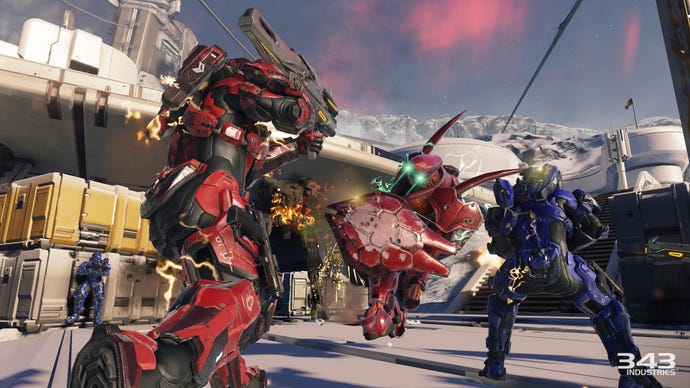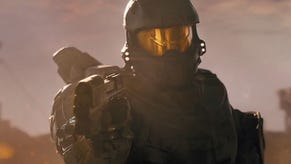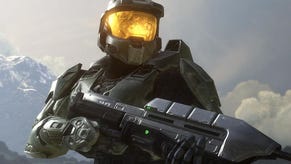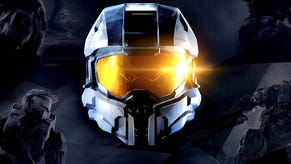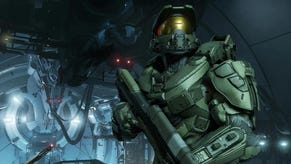Halo 5 has an all-new Forge built from the ground up
343 Industries has announced an all-new Forge mode for Halo 5: Guardians.
Released in 2007, Forge allowed players to collaborate and create new multiplayer sessions and test a map live while it was being built.
For Halo 5: Guardians, the Forge will provide more "power and control than ever before" and will be released in December.
343 has posted all sort of information on the Forge, and goes into great detail.
Here's the bullet list of the main features pulled directly from 343:
Controller-based edition 2.0
- Improved Control Scheme – Revised controls keeps users hands in the default “home” position so there’s less reaching for buttons which speeds up the building process. Don’t worry long-time Forgers, it took the Forgers we brought in a little bit to get used to but even the most hesitant were soon up and building maps at full speed.
- Multi-Select/Edit – Users can select and manipulate up to 64 individual objects at one time (more if combined with Groups); movement, rotation, property editing, everything you’re able to do to a single object.
- Free Camera – The camera no longer snaps to objects being edited. Users can freely position the camera to find the best vantage point to edit from. To orbit around selected objects like past Forges, simply click the right-stick to “lock on” to the objects and click again to cycle between multiple zoom levels.
- Contextual Control Helper – This lets the user see, in real time, what each controller input does. Users can change from “basic” settings to learn the ropes, “advanced” for the power user controls, or turn the helper off once everything becomes second nature.
- Grid/Rotation Snaps – Switch between multiple grid/rotation snap settings quickly to help align objects perfectly with each other. The bulk of the Forge specific assets are built to a grid so they interact perfectly with each other, making building even easier. There’s even a very small grid snap that can be used to fix z-fighting without making “bumps” or very precise grid editing.
- Precision Editing – Precision editing returns to enable fine tuning of object placement. On top of that, there’s a power user trick we call “double analog” precision that allows for even finer manipulation.
- Smart Magnets – Magnets no longer snap objects while moving them around. Instead they draw connection lines between magnets that will snap when the input is released. Additionally the camera can be aimed at magnets to influence which ones will snap giving extra precision when building with magnets.
Grouping
- Grouping – Groups can be created dynamically with a single button press. Select more objects and press the button again to add to the group or press the button again to split the group up. It’s really that simple.
- Welding – Grouped objects can optionally be welded to their “parent” object. This allows them to all physically move around together; make a soccer ball with traffic cone spikes that rolls around, or attach a weapon pad to a larger animating object. Our producer Mike loves to remind Ben that this feature is so important to make some of our Arena map designs work that it is LITERALLY the reason he was brought aboard. Good thing it happened because Forge is better because of the addition of both!
- More functionality: Will be discussed in the future regarding what makes them an even more useful tool in user generated content.
Object Pallets
- New Objects - Many new objects and the older objects have been rebuilt and brought up to meet the standards of Xbox One.
- 1600+ Objects – Take that in for a minute. Previous iterations of Forge had a couple hundred. Shaun, Randal, and Ryan on our art content team have been crazy busy building LOTS of pieces from primitive shapes, structure parts, accent pieces, detail props, and gameplay objects custom built for Forge. Mix them in with things like the weapons, turrets, and power-ups makes this Forge have pretty much the ultimate building block set you wished you had when you were eight years old. I’ve been working with our art lead Wade to try and squeeze in a few last assets before we’re done; that said we’re in pretty great shape.
- New Object Types – We’ve added lots of new types of object types to Forge this time; FX emitters, decals, invisible blockers (big community request), chroma screens for machinima makers, objects for building map intros/outros, and yes, even a large adorable whale toy that we love dearly.
- Projected Terrain Pieces – Our new terrain pieces sample textures from their position on one of our Forge maps which makes them blend in almost seamlessly with the prebuilt terrain of the level when you mix them together. Watching them move around the map for the first time generally breaks people’s brains for a few minutes because it looks like voodoo. I don’t think it’s actually voodoo but instead it’s a lot of complex graphics code which might as well be.
- Unconstrained Objects – We’ve maintained keeping all of the objects in Forge “map autonomous” meaning any object can be placed on any map thanks to our engines new asset management systems. Now users can experiment and try pretty much any idea on any map. For example if you wanted to you could place a Scorpion tank in the middle of Truth. This doesn’t mean you should, but you could.
- Object Enhancements – Lots of the returning objects have new features and improvements: Dial in the amount of extra clips with weapons. Man-Cannons and Grav Lifts launch distances and heights can be tuned in their properties and show the path where the players will go when used. Teleporters output directions can now be changed it displays which way players come out facing. We have commitment to improving everything Forge, not just the new.
True Budget
- New system separates the cost: This applies to an object across multiple different budgets that are tied to the real engine metrics (we don’t use dollars internally). This really enables Forgers to maximize what can be placed into a level to get the most out of the map.
- Multi-Budget System – Multiple budgets based on real engine systems; max object counts, memory, etc. This means when placing something like a large terrain piece, its large texture will only eat into the memory budget once, and additional same/similar pieces will only use up the object count budget because their shared texture is already loaded.
- Higher Object Count – We’ve increased the number of objects that can be placed in a Forge map to 1024. Higher object count allows for bigger maps with more detail than possible before.
- Soft Budgets – Some budgets are “soft” meaning they can be exceeded but will cause visual artifacts/anomalies. This lets you keep building around these budgets to find the fun, then come back later to fine tune things and make the map look prettier.
Lighting
- Light Objects – Place real light objects in the world to light up interior spaces or just enhance a location on a map. Light objects have a whole slew of properties; point and spot types, light color/distance/falloff, light cone shape/size, lens flairs, and “gobos” (the pattern projected from the light); customize pretty much every facet of the light imaginable.
- Light Fixtures – Additional light fixture objects such as light posts, beacon lights, etc. that come with lights built into them making it possible to set dress and light a space at the same time.
- Opt-in Light Bake – We no longer automatically generate the lighting every time the Spartan is dropped in to test gameplay. Tap the button to quick drop the Spartan or hold it down to render the lights before.
- Shadow Clamp – Change the clamp to prevent shadowed spots from getting too dark. Another great use for this is when building, it can be cranked up to help keep everything easier to see before doing a lighting pass.
Canvases
- Forge on any Arena/Breakout map: Have built three additional large maps custom tailored to maximize Forge-ability.
- Alpine – A beautiful terrain with rolling hills sandwiched between a cliff side wall and lake front to rip a Warthog down. It has that classic Halo world look that feels like a chunk of the Pacific Northwest was transposed somewhere on a distant planet. We even left some space out in the water for building over which is fun. If you played our Halo 5 MP Beta, you would likely recognize this map from both Orion and Pegasus because they were built on top of it in different locations.
- Glacier – A large snow and ice covered landscape with giant ravine cut down the middle. It’s pretty breathtaking to look at! So much that while it was up on someone’s screen today and Sparth randomly walked by it stopped him dead in his tracks so he could backup and say, “Wow! That looks amazing!” We agree.
- “Space” (name TBD) – Space has no terrain because, well, it’s space. It’s a big empty map with nothing nailed down but the boundary markers at the edges of the map which go away at game time. It’s pretty much as blank of a map as possible so the sky (or space) is really the limit.
- All Maps: Each has three different lighting themes that change the mood of the map. The themes changes general level lighting, background skybox, and other various effects; several of which are tunable in the map settings.
Colors
- Primary, Secondary, & Tertiary Colors – The vast majority of the Forge building pieces have tunable primary, secondary, and tertiary color change sections on them. This allows objects color variations from the blatantly oblivious to very subtle. Many also support changing the matte/metallic reflective properties of the color surface as well allowing for more visual variety from location to location.
- 100+ Colors – We have more colors in Forge this time than most people had in their crayon boxes growing up; representing a wide range of shades and hues from across the whole color spectrum.
- Reference Colors – Objects placed in the level generally pre-assigned come with colors that point to “reference colors” that are tunable in the options. Changing these colors in the map settings will immediately update the colors on all of the objects referencing them. It’s a great way to experiment with map coloring quickly and easily without having to edit a bunch of individual objects.
If you head over to Halo Waypoint, you can also find out more on the updated scripting, redesigned menus and HUD, the ability to show all boundaries, and tons more details.
We've already posted a wall of text. In bullet-form, mind, but we don't want to do your head in any further.
Halo 5: Guardians launches worldwide October 27 on Xbox One.
